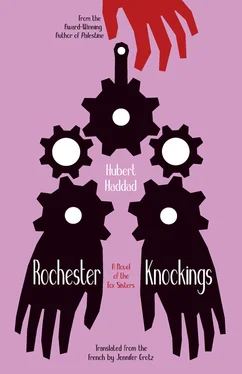“Of course you were loved, and even passionately. During the Civil War, in the battle at Chancellorsville, a man who you’d often spent time with gave me, at the moment of his death, his only treasure to give to you. It’s an Indian necklace, I’ve carried it with me for twenty years, hoping to be able to hand it over to you one day. .”
“A man?” Kate said.
“Alexander Cruik, the preacher,” Pill answered, unclasping the necklace from his neck. “This amulet will bring you fortune, it contains the umbilical cord of a Sioux chief killed in combat. .”
The necklace held tight in one hand, Kate looked at the slightly vacillating shadow of this secondary actor in her life who’d appeared out of nowhere and who, after walking her to the hotel where she claimed to live, returned to the great residence of oblivion into which disappeared everyone we have met on this Earth. Taking up her way toward the Hudson away from any of the numerous walkers in the summer night who might have tried to bother her, she opened her hand to look at the amulet, which a street child would immediately have run to snatch with the vivacity of a bird. Facing the shifting constellations of the river, while a ferryboat descended to its mouth, all pennants lit, she undid her veils and cape to taste the sea breeze.
Two sailors went up along the dock without seeing her. Falling down drunk, they bellowed loudly an incomprehensible tune:
Adieu foula’, adieu mad’as
Adieu guenda, adieu collier-chou
Dou-dou à moi, y va pa’ti’
Hélas, hélas, c’est pou’ toujou’
X.With Congratulations from Mister Splitfoot
Some years later, all the water in the sky had passed over the memory of men, and the death of Leah Fox-Underhill one winter night in 1890, who was significantly less influential after the family betrayal, was less widely talked about than the excruciating death of William Kemmler, the first person sentenced to execution in an electric chair thanks to the work of Thomas Edison, or the arrest and assassination of the Sioux chief Sitting Bull, followed by the massacres at Wounded Knee and Pine Ridge, which spared neither women nor children, or the vote of new segregationist laws in Mississippi and the southern states, or even the inauguration of the New York World Building, the tallest building in Manhattan. Spiritism, the uncompromising religion that, without recourse to hell or purgatory, assured the salvation of everyone through positive transmigration and the upward path of spirits toward the celestial light, had supplanted Modern Spiritualism and its avatars worldwide. Which in no way caused braggarts, fanatics, or speculators to give up, or any kind of the socially confused, those multitudes without imagination who had never known how to behave confronted by the unknown.
Masses of immigrants continued to rush in from Europe and Asia. To the Irish Catholics were added those from Poland and Italy. The Germans fleeing cholera or Weltpolitik, the Taoist Chinese or the Buddhists from Fujian and Guangdong, the Jews from the Russian empire escaping pogroms, all landed continuously by the thousands on Ellis Island and its pontoons on the East River. Each of them wandered like convalescents in exile, distraught under the same sky, with their nostalgia returning as a foolish hope. In this anthill of fermentation, the margin was a fine line between the asocial needy and the workers, reckless or trafficking bourgeois, dignitaries and mafia, excited devotees and foolish free spirits. But all were working blindly, in various ways, under justice or outside the law, for the grand melting pot in the making.
Away from that human cosmos, living from begging or mysterious gifts, sleeping here and there, in shelters, rooms where a cot cost a dollar or two a night, or under the stars between the high walls of buildings, Kate Fox managed to keep her appearance neat and shoes clean, letting her hair be done by charitable prostitutes, keeping her clothes spotless thanks to the helping hand of the laundry room of an evangelical home. She’d only seen Margaret again once since the catastrophic revelations at the Academy of Music. Both of them, overcome with remorse when learning of Leah’s illness, had attempted to seek her pardon. The moment after, downing whiskey upon whiskey in a port-side tavern and forcing Kate to drink along with her, Margaret got carried away, cursing again their madam of a sister who had to give up the ghost without a word of reconciliation. The two younger sisters separated shortly after that, frozen in the lucidity of intoxication, and the weeks and seasons had flown by like the clouds in a great wind, with a sort of disenchanted haste.
Vagabond, Kate was at home in her meandering. She could no longer see herself as wandering, going from one palace of leaves illuminated by a bright round moon, to the distracted temple of a bar from which she left drunker than five giants sunk in the soil . In her bewilderment, everything finally made sense, forever, forever, forever! How beautiful reality was, finer than a cigarette paper between the fingers and charred lungs of God. She perceived the voices of Creation, barely audible, and the geometric figures of an infinite precision that were endlessly in the middle of her skull. She laughed all alone sometimes, passed by the faces mixed in crowds between Fifth Avenue and the Harlem River. Who hears the Spirit? You or me?
O sister in the bath, the water is so cold
That your tears burn me
An eternal Negro came to take her in his arms, one night when she’d fallen, a footprint in the shape of a heart on his forehead. Don’t cry Madame, God doesn’t forget you, don’t cry, life is not down here. She stood up, very small, like in the days of Pequot. There remained for her the path between the Palace of Leaves and the Temple of the Bar. Alcohol is like eternity. Lost secret, I’m coming to you, hair already white. One night, in a dollar-a-night hostel, a princely man came to inhabit her dream. Oh Katie, little sorceress, it’s almost time to end this play-acting.
“But who are you, I don’t recall.”
“The ghost of a man who didn’t love women and who loved you, star of the final hour.”
“It’s you, Lucian, you’re dead, you too?”
“Dead? Living? Who can affirm that he isn’t sleeping?”
“I remember. You told me: don’t be afraid.”
“I told you, when you were sleeping, forever, forever, forever, I will be next to you. What importance is today or tomorrow, and all the kings covered in sweat?”
“I don’t understand.”
“It’s necessary for us not to stray from the path of flowers.”
“I don’t understand.”
Kate loved the pigeons rising all of a sudden, like a saber dance. In Central Park, for entire days, she watched other people’s twins, all the children were twins. She told herself there was no sound louder than memory. Her children were playing next to her, grown up, now bigger than her, they were there in spirit. Why should one weigh the soul and matter? No, no magic. She would have liked for Margaret to be with her, not angry, in the violent insomnia of specters. She knew well, Maggie, that all their lies hid a bigger truth, immense, knees bent on the misty hillside, in a dying autumn in Hydesville. .
Am I your sad king
Your lover on the last night
When the Salvation Army sanitation services, quite busy in winter, found her on a bench, a blanket of snow barely scrawled on her chest, she was smiling in archangelic crystals, perfectly alive, and endlessly murmuring words that the ambulance volunteers couldn’t or didn’t want to understand. Was it, “don’t come to console me,” was it, “the fallen life is homeless,” was it, “we are all wandering spirits”? In the rickety cart, at the exact moment of being all finished with flesh and these memories, Kate bristled, her eyes immensely open.
Читать дальше












